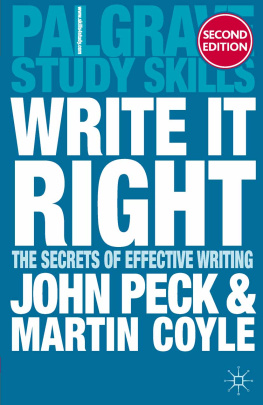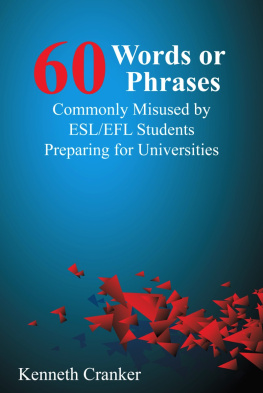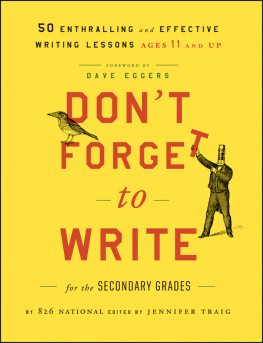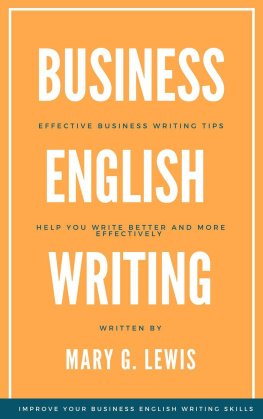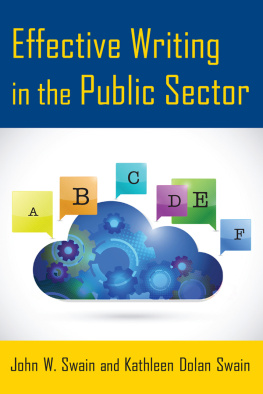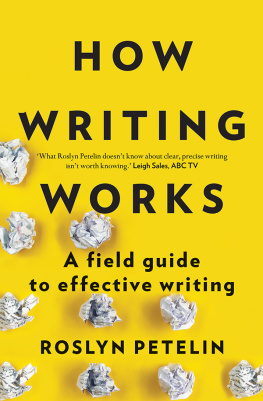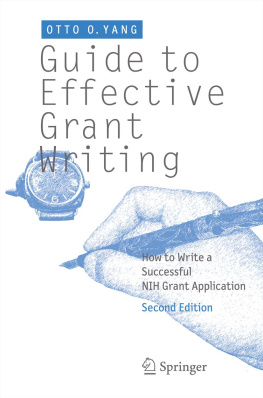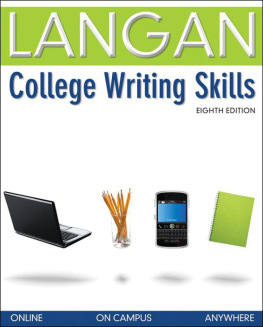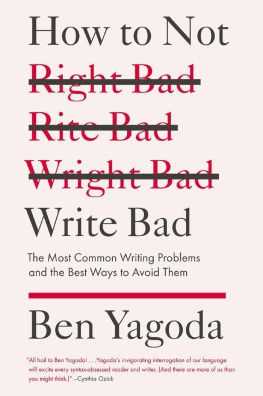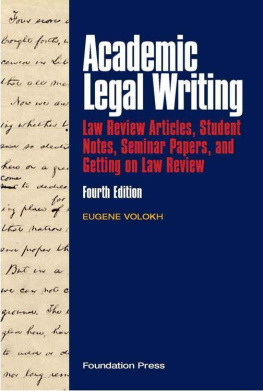Write it Right
www.skills4study.com the leading study skills website
Palgrave Study Skills
Business Degree Success
Career Skills
Cite Them Right (8th edn)
Critical Thinking Skills (2nd edn)
e-Learning Skills (2nd edn)
The Exam Skills Handbook (2nd edn)
Great Ways to Learn Anatomy and Physiology
How to Begin Studying English Literature (3rd edn)
How to Manage Your Distance and Open Learning Course
How to Manage Your Postgraduate Course
How to Study Foreign Languages
How to Study Linguistics (2nd edn)
How to Use Your Reading in Your Essays
How to Write Better Essays (2nd edn)
How to Write Your Undergraduate Dissertation
Information Skills
The International Student Handbook
IT Skills for Successful Study
The Mature Students Guide to Writing (3rd edn)
The Mature Students Handbook
The Palgrave Student Planner
Practical Criticism
Presentation Skills for Students (2nd edn)
The Principles of Writing in Psychology
Professional writing (2nd edn)
Researching Online
Skills for Success (2nd edn)
The Students Guide to Writing (3rd edn)
Study Skills Connected
Study Skills for International Postgraduates
The Study Skills Handbook (3rd edn)
Study Skills for Speakers of English as a Second Language
Studying History (3rd edn)
Studying Law (3rd edn)
Studying Modern Drama (2nd edn)
Studying Psychology (2nd edn)
Teaching Study Skills and Supporting Learning
The Undergraduate Research Handbook
The Work-Based Learning Student Handbook
Work Placements A Survival Guide for Students
Write it Right (2nd edn)
Writing for Engineers (3rd edn)
Writing for Law
Writing for Nursing and Midwifery Students (2nd edn)
You2Uni
Pocket Study Skills
14 Days to Exam Success
Blogs, Wikis, Podcasts and More
Brilliant Writing Tips for Students
Completing Your PhD
Doing Research
Getting Critical
Planning Your Essay
Planning Your PhD
Reading and Making Notes
Referencing and Understanding Plagiarism
Reflective Writing
Report Writing
Science Study Skills
Studying with Dyslexia
Success in Groupwork
Time Management
Writing for University
Palgrave Research Skills
Authoring a PhD
The Foundations of Research (2nd edn)
The Good Supervisor (2nd edn)
The Postgraduate Research Handbook (2nd edn)
Structuring Your Research Thesis
For a complete listing of all our titles in this area please visit www.palgrave.com/studyskills
Write it Right
The Secrets of Effective Writing
2nd edition
John Peck and Martin Coyle


John Peck and Martin Coyle 2005, 2012
All rights reserved. No reproduction, copy or transmission of this publication may be made without written permission.
No portion of this publication may be reproduced, copied or transmitted save with written permission or in accordance with the provisions of the Copyright, Designs and Patents Act 1988, or under the terms of any licence permitting limited copying issued by the Copyright Licensing Agency, Saffron House, 610 Kirby Street, London EC1N 8TS.
Any person who does any unauthorized act in relation to this publication may be liable to criminal prosecution and civil claims for damages.
The authors have asserted their rights to be identified as the authors of this work in accordance with the Copyright, Designs and Patents Act 1988.
First edition 2005
Second edition 2012
Published by
PALGRAVE MACMILLAN
Palgrave Macmillan in the UK is an imprint of Macmillan Publishers Limited, registered in England, company number 785998, of Houndmills, Basingstoke, Hampshire RG21 6XS.
Palgrave Macmillan in the US is a division of St Martins Press LLC, 175 Fifth Avenue, New York, NY 10010.
Palgrave Macmillan is the global academic imprint of the above companies and has companies and representatives throughout the world.
Palgrave and Macmillan are registered trademarks in the United States, the United Kingdom, Europe and other countries.
ISBN: 9780230373846
This book is printed on paper suitable for recycling and made from fully managed and sustained forest sources. Logging, pulping and manufacturing processes are expected to conform to the environmental regulations of the country of origin.
A catalogue record for this book is available from the British Library.
A catalog record for this book is available from the Library of Congress.
10 9 8 7 6 5 4 3 2 1
21 20 19 18 17 16 15 14 13 12
Printed in China
About this Book
It has often been pointed out that every diet book ever written could be reduced to one sentence: Eat less food, making sure it is the right kind of food. We have written a book about how to write effectively, but the truth is that the entire secret of effective writing can be summed up in one sentence: Write shorter sentences, making sure the sentences are correctly punctuated. That sounds easy enough. As everyone knows, however, writing clearly and correctly, especially in an essay, is always a challenge. There might be a few people with a natural gift for handling words, but most of us find it hard work.
As with so many activities in life, it helps if one gets the basics right. In the case of writing, this starts with being able to produce straightforward and correct sentences. Time and time again, the way of working out how to convey a complex point in an essay is to forget about writing a long and complicated sentence that covers the whole point in detail. Instead, explain the point step by step. Focus on producing a sequence of short sentences that conform to the basic rules of correct usage. The problem is that, by the time we are taking demanding examinations in a variety of subjects, most of us have forgotten a lot of the basic rules about correct usage.
It has always been the same. In the course of writing this book we looked at a large number of grammar and writing guides published over the course of the last hundred years. People a hundred years ago were making just the same mistakes that are made today, and, even more predictably, those who always complain about a decline in standards were, a hundred years ago, making just the same complaints about a decline in the standards of written English. Just when, we wonder, was this golden age when everyone emerged from primary school with a confident awareness of how to write perfect English?
The reason we looked at so many works about language skills was that we were conscious of a very real problem in trying to teach writing through the medium of a book. It might come as something of a surprise, but books about how to write are almost invariably badly written. We dont mean that the authors write ungrammatical sentences, but rather that, in chapter after chapter, they write in a way that fails to command the readers attention. Grammar guides, in particular, tend to be full of hundreds of fragmentary examples and bewildering diagrams. Such guidance might be ideal if you are looking up the solution to a specific problem, but it is difficult to concentrate over the course of several pages of such works. What everyone needs when they read any book is a narrative; that is, they need something that sustains interest and carries them along. But how can this kind of narrative interest be sustained when dry rules are being expounded? Its a bit like the old joke about the telephone directory: great cast of characters, but not much of a plot. Indeed, our impression is that some grammar guides are so complicated that the reader is likely to know less, rather than more, after trying to read them.
Next page
